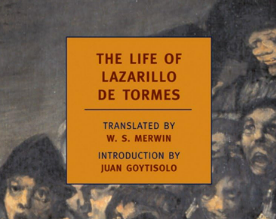Chapter VI: How They Took Lazaro to Toledo
byChapter VI: How They Took Lazaro to Toledo begins not with a journey but with a night of utter confusion that spiraled far beyond control. In a crowded inn brimming with suspicion, noise, and shadows, neighbors and constables alike rushed in, responding to cries of theft. Sailors claimed their fish had been stolen, prompting a frantic search for culprits no one had seen. Amid the madness, Lazarillo was not merely a bystander. He was returned to the very vat where he had suffered once before, wedged into the space as if he were both part of the furniture and the farce. From this dark, damp spot, he became an accidental witness to a bizarre escape—a priest and the innkeeper’s daughter scrambling out a window without clothes, drenched and terrified. Their foolish dash under the moonlight was mistaken for criminal flight, sealing their fate in jail and leaving Lazarillo, once again, stuck in a narrative not of his making.
The morning brought no clarity, only aftermath. Fishermen, oblivious to the depth of the havoc they had caused, packed up and left for Toledo, unaware their outcry had sparked arrests and ridicule. For Lazarillo, the episode marked another bruise on a life already filled with humiliations. He was dragged from the inn, not with sympathy, but as an inconvenience blamed for what others had done. His guardians, angry and embarrassed, saw him not as a boy but as a symbol of every misstep, lashing out with words and fists. Along the way to Toledo, he was beaten relentlessly, their fury boiling over in curses. They shouted that he was like an oak tree—stubborn, unyielding, deserving of punishment until he broke or bled. Each step hurt more than the last, yet he remained silent, knowing pain offered no defense and no reprieve.
The journey to Toledo was neither a punishment with purpose nor a hope for reform. It was simply a release of frustration, with Lazarillo as the outlet. His bruises became proof of others’ failures, and no one asked what he had felt or seen. In his mind, he turned inward, trying to make sense of the events. He thought of how quickly roles change—how lovers become fugitives, how onlookers become suspects, how truth becomes irrelevant when authority demands answers. His suffering had no clear villain and no resolution, just a tangled web of foolishness that left him hurt and blamed. He realized that sometimes, misfortune requires no planning—it simply finds those too weak to resist it.
Toledo, with its grand buildings and crowded streets, did not greet him with promise. It merely became the next stage in a long pattern of instability. As Lazarillo limped into the city, he wasn’t curious or afraid—just numb. His body ached, but worse was the weight of knowing that those who brought him here would forget his name long before his bruises healed. He saw how power, whether religious or legal, turned quickly against those without defense. The priest who ran naked into the night would likely be forgiven. Lazarillo, who had simply existed in the wrong place, would be remembered only as a troublemaker, though he had caused no harm.
Still, in his quiet reflection, he clung to something deeper. He thought about his past masters and the lessons each had taught him, not through kindness but through cruelty. He remembered one who spoke of the futility of striving without the favor of heaven, and the idea returned to him now with sharp clarity. People may punish each other out of pride, but true peace—or success—must come from something higher. Without divine grace, all efforts collapse into vanity, like fish spilled on dry land. Lazarillo, though broken, did not lose his faith in change. He believed that life might still hold a reversal for him, just as it had so often turned against him before.
In the quiet of his pain, a strange sort of resilience grew. The city did not welcome him, but he walked its stones anyway. His dignity had been stripped away piece by piece, yet something within him refused to surrender. He was still the boy who survived every master, every lie, every fall. And now, in Toledo, he would begin again—not by choice, but because moving forward was the only direction left. His story would go on, as long as he could keep walking and keep telling it.

